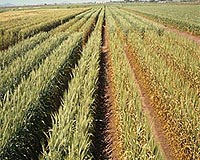 |
Manila, Philippines (UPI) Apr 26, 2011 Soaring food prices threaten to push millions of people in developing areas of Asia into extreme poverty, a report from the Asian Development Bank warned. "For poor families in developing Asia, who already spend more than 60 percent of their income on food, higher food prices further reduce their ability to pay for medical care and their children's education," ADB chief economist Changyong Rhee said Tuesday. "Left unchecked, the food crisis will badly undermine recent gains in poverty reduction made in Asia." Food prices in many Asian economies have increased an average of 10 percent in early 2011, which ADB says could push an additional 64 million people into extreme poverty based on the $1.25-a-day poverty line. The World Bank's latest Food Price Watch report released this month indicates food inflation rates of 17 percent, 15 percent and 11 percent for Vietnam, Indonesia and China, respectively. Rapid and continuing increases in the cost of many Asian food staples since the middle of 2010, along with crude oil reaching a 31-month high in March, represents a major setback for the region, which had experienced a strong rebound from the global economic crisis, ADB says. Production shortfalls due to bad weather, along with a weak U.S. dollar, high oil prices and ensuing export bans by several key food-producing countries triggered much of the upward global price pressure since last June, ADB says. This resulted in double-digit percentage increases in wheat, corn, sugar, edible oils, dairy products and meat. If global food and oil price hikes seen in early 2011 continue for the rest of the year, ADB says, economic growth in the Asian region could fall by 1.5 percent. Pointing to falling grain stocks, the "Global Food Price Inflation and Developing Asia" report says the pattern of higher and more volatile food prices is likely to continue. Adding to this, many of the conditions that drove up food prices in 2008 are at work again, including rising demand from wealthier developing countries; competing uses for food grains; shrinking available agricultural land and stagnant or declining crop yields. "To avert this looming crisis it is important for countries to refrain from imposing export bans on food items, while strengthening social safety nets," said Rhee. "Efforts to stabilize food production should take center stage, with greater investments in agricultural infrastructure to increase crop production and expand storage facilities, to better ensure grain produce is not wasted."
Share This Article With Planet Earth
Related Links Farming Today - Suppliers and Technology
 Growing threat of wheat rust epidemics worldwide
Growing threat of wheat rust epidemics worldwideAleppo, Syria (SPX) Apr 25, 2011 For more information, see http://icarda.org/wheatrust/ and www.globalrust.org Researchers meeting at a scientific conference in Aleppo this week reported that aggressive new strains of wheat rust diseases - called stem rust and stripe rust - have decimated up to 40% of farmers' wheat fields in recent harvests. Areas affected are North Africa, the Middle East, Central Asia and the Caucuses, incl ... read more |
|
| The content herein, unless otherwise known to be public domain, are Copyright 1995-2010 - SpaceDaily. AFP and UPI Wire Stories are copyright Agence France-Presse and United Press International. ESA Portal Reports are copyright European Space Agency. All NASA sourced material is public domain. Additional copyrights may apply in whole or part to other bona fide parties. Advertising does not imply endorsement,agreement or approval of any opinions, statements or information provided by SpaceDaily on any Web page published or hosted by SpaceDaily. Privacy Statement |